It’s a cold Sunday morning in Boulder, Colorado but Isabel Lopez sits in the comfort and warmth of her aunt’s living room, surrounded by twelve of her family members. They are all laughing and joking, passing around a bag of mandarin oranges. The smell of fresh citrus fills the air. This gathering is the first group to form as part of Philanthropiece’s local Community Savings Group pilot program. Lopez found out about the program after her aunt met Jordan Bailey, Philanthropiece’s Field Coordinator, while he was giving a presentation on the idea of community savings groups to local community leaders.
“My aunt went to a conference and she got us all excited. We already had this idea in mind, that we should gather and save as a family, but we never had the setting or the structure to make it happen. My parents don’t have a lot of financial knowledge to work from,” Lopez explained.
Isabel’s family members are part of an often under-recognized segment of the U.S. population, known as unbanked or underbanked individuals. According to the FDIC, over 30 million people in the U.S. are not connected to formal banks or financial sectors. That includes 27% of residents in Boulder County. There are a variety of factors that lead to individuals being disconnected from formal financial systems. These can include having an undocumented citizenship status, feeling mistrust in financial systems that are difficult to understand or having previous negative experiences within those systems, such as in the form of unexpected bank fees or highly variable loan interest rates.
Being unbanked or underbanked causes individuals to rely on alternative financial systems, including check-cashing agents, payday loans, pawnshops and moneylenders. All of these services can add up. Bank On Boulder reports that, over the course of their lifetimes, these individuals can spend up to $42,000 on fees for such services, expenses that people using formal banks don’t incur. It is a daunting problem and it connects directly to issues of economic justice in our society.
Faced with these statistics and motivated to work on local initiatives, Philanthropiece has decided to launch a Community Savings Group (CSG) pilot program in Boulder County, starting in March 2019. A CSG is composed of 10-25 people who trust each other and meet on a weekly basis to save money. A trainer teaches the group how to manage these savings in a safe and responsible manner. As a culture of saving for the short and long term is cultivated, the group eventually learns how to use this money to issue loans among themselves. They determine terms and interest rates and ensure that all returns stay within the group. Along the way, they can build confidence, develop leadership skills, and learn basic financial education.
Philanthropiece first starting working with the CSG methodology in Mexico in 2010 and to date, has provided free financial training to over 1,900 people there. Participants who had never saved in their lives are now managing savings and loans that cover things such as school tuition, health emergencies, business investments, and home repairs. Philanthropiece has been inspired to use its knowledge and expertise from Mexico, to address issues of economic justice more locally.
“Since we’ve seen the success of the program in Mexico and the benefits and potential of it, we are hoping to bring it here to Colorado, in the form of a pilot program. During the pilot program, we will take on between 3-5 savings groups. With those groups, we’ll be able to have focus groups, do surveys, analyze information we gather and talk with the community about needs, wants, desires and dreams. And then, after 6-9 months, we will be making decisions on the information we’ve gathered from those pilot groups,” explains Jordan Bailey.
Beyond simply providing a safe mechanism for saving and access to favorable loans, Philanthropiece sees the CSG program as a platform for deeper community development. In Mexico, they have seen group members collaborate on entrepreneurial initiatives, form cooperatives, increase resiliency, and improve overall economic preparedness and decision making abilities.
Working locally presents some unique opportunities, since there are already financial resources and trainings available in Boulder County that these groups could access. As part of the pilot program, Philanthropiece is working to foster local relationships and to make connections between organizations and individuals that often have problems finding each other. Local financial organizations have expressed to Philanthropiece that they have struggled to connect appropriately to the Spanish-speaking population. Philanthropiece sees itself as playing a unique role in facilitating these relationships, as part of its broader focus of creating resiliency and interconnectedness within communities. Ultimately, Philanthropiece sees the CSG methodology as a way to build trust, to inspire creativity and to create opportunities for learning and organizing.
Isabel Lopez feels that she is already noticing those types of shifts within her own family, as a result of their work as a CSG. “When Jordan first came to talk to my family about [Community Savings Groups], it seemed complicated. But we’ve had people to help guide us along the way. And we have already learned a lot about financial education,” says Lopez.
For more information on Philanthropiece’s Community Savings Group program, please contact Jordan Bailey directly at jordan@staging.philanthropiece.flywheelsites.com.
Morning Glory Farr is Philanthropiece Foundation’s Content Manager and Editor, as well as a member of the Advisory Board. She began her tenure with the organization back in 2009 when she lived and served as Community Liaison in Laguna San Ignacio, B.C.S., Mexico, the home of Philanthropiece’s original Community Savings Group.

